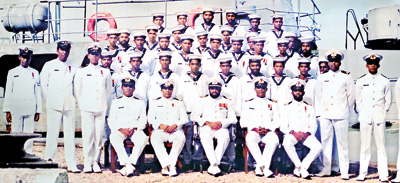Sunday Times 2
Extract from the book Prologue
View(s):
'Commodore Boyagoda (front, centre) dedicates his story to this crew of the SLNS Sagawardene, many of whom did not survive the attack on the ship on September 19, 1994, when he was captured'.
Nowadays I introduce myself as a retired naval officer. I don’t say more than that. People search my face, puzzled. ‘Haven’t we met before?’ I mention my name and they feel sure we have. ‘It’s such a familiar name; I know your face; where did we meet?’ If they won’t drop it, I say, ‘maybe you’ve seen me on TV’ and let a bit of the story tumble out. But I’ve only ever given a vague account. ‘How did they treat you?’ I’m asked. ‘They treated me well’ I’ve always said. We move on to other things.
When I came back I tried, in a way, to say as little as possible. I wanted to be the man who had left eight years earlier. I didn’t want my wife and children to feel any more alienated from me than they did already, after such a long absence. I wanted to seem familiar around the house. I was not, of course. To this day my boys will go to their mother before they come to me about anything. I am the father who did not see them grow up.
When I first came home, it took a month or two before I could even move without awkwardness. I had grown used to having a sentry standing by. If I wanted to go to the toilet, back in my own home, I would look for someone whose permission to ask.
Out in the world, some people had decided I was a hero, others had me down as an infamous traitor. In a day I had been flown from my jungle cell to a tea party with the Prime Minister. For so long forgotten, suddenly I was surrounded. But I had been through the opposite transition eight years before when I, a ranking naval officer, realised I must quickly learn the humility required of a prisoner. I used the memory of that first transformation to undertake the one I now faced, a prisoner who had to think of himself again as a man in the world. In this too, I risked coming apart.
 Occasionally my wife would hear me answer someone else’s question and say, ‘I didn’t even know that’. When people asked questions they usually did not want long answers. They didn’t want the answers I gave them. If I had said I was put in an underground cell, I was put in a dog cage, I didn’t have a square meal in eight years, I was lashed, my finger nails were removed to extract information but I still didn’t divulge anything? Then I think they would have been interested. It could have worked out well for me. But even if I had been treated that way, I would never have said it.
Occasionally my wife would hear me answer someone else’s question and say, ‘I didn’t even know that’. When people asked questions they usually did not want long answers. They didn’t want the answers I gave them. If I had said I was put in an underground cell, I was put in a dog cage, I didn’t have a square meal in eight years, I was lashed, my finger nails were removed to extract information but I still didn’t divulge anything? Then I think they would have been interested. It could have worked out well for me. But even if I had been treated that way, I would never have said it.
I made a decision when I was released from captivity that I wasn’t going to help make things worse. Over my career I had seen divisions between the Sinhala and Tamil communities deepen enough. I wanted no further part in creating a cause for war. So when people asked me how the Tigers had treated me, I always said they treated me well. This was also the truth – my experience only fluctuated according to the goodness of each individual guard.
This is how I feel about it. Of course it was not a situation I would have chosen. Of course it was an experience that hurt me in ways I cannot heal. But I was a prisoner of war and the treatment I received was as good as I could have expected in the circumstances.
I could see when I came home that people did not want to hear the story I told. I had been a prisoner of one of the most ruthless terrorist organisations in the world yet I couldn’t tell a ruthless story. People talk about the LTTE all the time; I lived with them for eight years and no one – not even my own naval command – ever wanted to hear my account of what they were like.
I know mine is not the only story. I have heard screams coming from underground cells. But this is my story, such as it is.
—-Taken from A Long Watch by Commodore Ajith Boyagoda, as told to Sunila Galappatti

